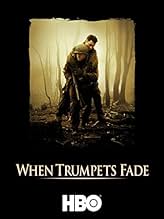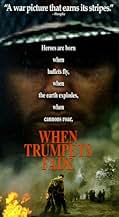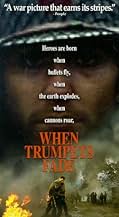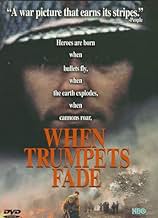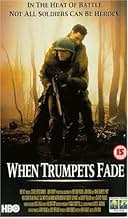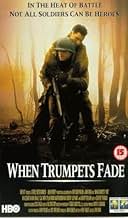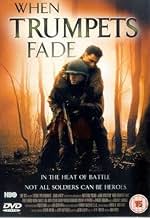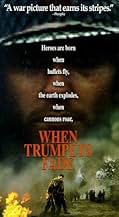The Sound of War - Wenn Helden sterben
Originaltitel: When Trumpets Fade
IMDb-BEWERTUNG
7,0/10
8938
IHRE BEWERTUNG
Füge eine Handlung in deiner Sprache hinzuA private in the latter days of WWII on the German front struggles between his will to survive and what his superiors perceive as a battlefield instinct.A private in the latter days of WWII on the German front struggles between his will to survive and what his superiors perceive as a battlefield instinct.A private in the latter days of WWII on the German front struggles between his will to survive and what his superiors perceive as a battlefield instinct.
- Auszeichnungen
- 1 Gewinn & 5 Nominierungen insgesamt
Frank-Michael Köbe
- German Sergeant
- (as Frank Köbe)
Matthew Rutson Cooney
- Driver Corporal
- (as Matthew Ruston Cooney)
Brian Hicks
- 1st Sergeant
- (as Gy. Sgt. Brian Hicks USMC)
John Miller
- Radio Man
- (as Cpl. John Miller USMC)
Peter Thomas
- News Footage Narrator
- (Synchronisation)
Empfohlene Bewertungen
Due to the fact that the two films came out close together, it is tempting to compare When Trumpets Fade to Saving Private Ryan. This would be a mistake. Unlike Private Ryan, Trumpets is not an epic set to a background of a crucial point in history, like D-Day, nor are the central characters members of an elite unit who are given a "heroic" assignment. Instead, the main character, Manning (Eldard), starts off as a private reluctant to risk his life, but who finds himself promoted and burdened with increasing responsibilities he does not want as his unit suffers horrendous attrition attempting to fight its way into Germany in late 1944. Manning's dilemma both contrasts and parallels that of his company commander, Captain Pritchett (Donovan), who has to balance achieving the objectives he has been assigned and keeping as many of his men alive as he can, and succeeding at neither. The greatest contrast with Private Ryan, however, comes in the form of the replacement troops, all green recruits with no combat experience - a far cry from Captain Miller's seasoned Rangers. Rounding it off is Dwight Yoakam as the nameless battalion commander who is unapologetic about driving his men to the slaughter, but whose face betrays the fact that, as with Captain Pritchett, their deaths weigh heavily upon him. When Trumpets Fade successfully showcases combat at its most gruesome and frustrating as Captain Pritchett's company batters itself to pieces against its target with nothing to show for the effort and bravery of the men except an ever-increasing pile of American corpses. But we get two good looks at the face of a German squad leader, portrayed by Frank-Michael Köbe, and in it we can see the despondency of a man who knows that he is fighting only to postpone the inevitable defeat of his country. A gritty, realistic, and depressing, but nonetheless excellent film.
When Trumpets Fade is a very decent war movie, but the fight scenes seem a tad bit fake. They are fighting a battle in Hurtgen Forest at the border of Belgium that seems to be impossible to win, and the platoon attempts many pushes against the German line with no avail. The main obstacle for the US troops is the tanks and flak 88 guns that their artillery cant take out. The newly appointed Sergeant Manning is given a squad of 4 men and ordered to go and take out the flak guns across from the bridge. The movie shows the difficulties and mental stress that comes with leading in war, and how sometimes you have to go to drastic measures to maintain control of the situation. This film is a great tribute to the remembrance of a very important battle that most people don't know about. I recommend it to everyone and you should all learn to love SANDERSON!!!
The film makers obviously intended a memorial to the soldiers who fought and died in the Hurtgen Forest. Though this was not a docudrama, the story had to be true to the context, and for what I could tell, it definitely achieved that goal. The Battle was not a victory for the U.S. forces. The Germans pushed back the Allies during this battle, creating the "bulge" in the front lines. The Battle of the Bulge was a later victory, and it is duly remembered. But the Hurtgen Forest campaign, which was a defeat and by many commentators is viewed as a huge strategic blunder paid for in American blood, has largely been forgotten.
Why does everyone (including viewers) assume that Manning is a coward? Because he is the only survivor of his platoon? Perhaps that assumption accurately reflects the command mindset which caused so many deaths: death is so cheap that one more death is expected, in order to prove valor. (That is not a new concept, "The Red Badge of Courage" had it in a Civil War context; but it also seems to be a motivation for contemporary suicide bombers.) Contrast that with these soldiers' motives for the last mission--when the objective was clear: to save their own lives, rather than to make a noble but unavailing gesture.
Usually war films have more plot. But the Hurtgen Forest campaign was not as carefully plotted as a screenplay. Did any mission in this film seem to have any real point? The battle is accurately reflected here. This is not a compelling film, and it does not attempt to impart any great moral lessons, but it's best virtue is that it is honest.
My late father was in the "Bloody Bucket" (the 28th Infantry, Pennsylvania National Guard--note the red keystone insignia) during this battle, and he was fortunate to have survived. Decades later, he often would say to me that the trees could kill you. I was never really sure what he meant. This film showed me what he meant: the tree tops which were blown off by artillery fire would fall on the soldiers below.
Why does everyone (including viewers) assume that Manning is a coward? Because he is the only survivor of his platoon? Perhaps that assumption accurately reflects the command mindset which caused so many deaths: death is so cheap that one more death is expected, in order to prove valor. (That is not a new concept, "The Red Badge of Courage" had it in a Civil War context; but it also seems to be a motivation for contemporary suicide bombers.) Contrast that with these soldiers' motives for the last mission--when the objective was clear: to save their own lives, rather than to make a noble but unavailing gesture.
Usually war films have more plot. But the Hurtgen Forest campaign was not as carefully plotted as a screenplay. Did any mission in this film seem to have any real point? The battle is accurately reflected here. This is not a compelling film, and it does not attempt to impart any great moral lessons, but it's best virtue is that it is honest.
My late father was in the "Bloody Bucket" (the 28th Infantry, Pennsylvania National Guard--note the red keystone insignia) during this battle, and he was fortunate to have survived. Decades later, he often would say to me that the trees could kill you. I was never really sure what he meant. This film showed me what he meant: the tree tops which were blown off by artillery fire would fall on the soldiers below.
A tense and unforgiving war epic that follows David Manning (Ron Eldard), an American soldier in World War II who tries to get a discharge for being mental unstable although his superior officer, Captain Roy Pritchett (Martin Donovan) who immediately promotes him to be the squad leader of a platoon where all the members are new and inexperienced.
The performances here are nothing short of excellent, the battle scenes are well-executed, and Thomas Burstyn's photography isn't only gloomy, it also hides some unexpected surprises from Germans to mines, that are hidden in the ground.
Director John Irvin, who is no stranger to making effective and intelligent war films ("Hamburger Hill", "The Dogs of War") and turning raw talent into top-notch, has made another classic here. What this film has in common with the previous movies is that one or some of the characters are cynical or determined to survive. However, it's a shame that this film was only made for cable instead of being given a fair chance to gain some attention at the box office.
The performances here are nothing short of excellent, the battle scenes are well-executed, and Thomas Burstyn's photography isn't only gloomy, it also hides some unexpected surprises from Germans to mines, that are hidden in the ground.
Director John Irvin, who is no stranger to making effective and intelligent war films ("Hamburger Hill", "The Dogs of War") and turning raw talent into top-notch, has made another classic here. What this film has in common with the previous movies is that one or some of the characters are cynical or determined to survive. However, it's a shame that this film was only made for cable instead of being given a fair chance to gain some attention at the box office.
When Trumpets Fade is a great movie, with excellent action sequences, fine acting and a sound storyline. It's better than Platoon, and I'd put it up there with 84 Charlie Mopic, except that it deals with infantry warfare during WWII. It came out after a series of real to life WWII movies, Saving Private Ryan, The Thin Red Line, but is made on a smaller budget and apart from Ryan's opening scene, it is a better movie. The cast consists of thoroughly unknown but very skilled actors, and the movie gives you a feel of what it must have been like to be on the front line in the Huertgen Forrest in Germany, late 1944. The Hungarian location adds realism as well.
The story basically revolves around the single minded efforts of private (then sergeant, then lieutenant) Manning (Ron Eldard) to stay alive and out of the meatgrinder that is conventional warfare, no matter what, even though ironically, the fact that he survives means that he has to put up for ever more dangerous tasks because he's the only one near who has any close-up experience.
I'll add that the videostore I go to allows you to rent 5 movies for the price of 3, and keep them for a full week. Every day after watching another movie, I couldn't help but re-watch "When Trumpets Fade", and every time I found something new and something more made sense to me.
This is one outstanding movie, very well produced and if you like war movies from the grunt's point of view, don't miss it.
The story basically revolves around the single minded efforts of private (then sergeant, then lieutenant) Manning (Ron Eldard) to stay alive and out of the meatgrinder that is conventional warfare, no matter what, even though ironically, the fact that he survives means that he has to put up for ever more dangerous tasks because he's the only one near who has any close-up experience.
I'll add that the videostore I go to allows you to rent 5 movies for the price of 3, and keep them for a full week. Every day after watching another movie, I couldn't help but re-watch "When Trumpets Fade", and every time I found something new and something more made sense to me.
This is one outstanding movie, very well produced and if you like war movies from the grunt's point of view, don't miss it.
Wusstest du schon
- WissenswertesThe red keystone unit patch signifies that Manning and the others are part of the The 28th Infantry Division. The 28th is a unit of the Army National Guard and is the oldest division-sized unit in the US armed forces.
- PatzerThe Dragons teeth of the Siegfried line are not shown as they really were (and in numerous places still are today). 1) In the movie the line is built with four rows of teeth. In reality the line is built with five rows. 2) The teeth are in reality not made in one size as shown in the movie, but in 3 different sizes, where the first and last rows contain the biggest pillars, the middle three are middle sized, and woven in the last row you can find the smallest. 3) The rows are not placed exactly behind each other. If you would see them from above, you would see an angle in the middle. 4) The rows of pillars are also not built in one line. If you would look over a row from the side, you would see a zigzag of pillars. 5) The pillars in the movie are too close to each other. In reality, the area between two pillars is so big, you can park a car between them (as is done by the author of this comment on numerous occasions).
- Zitate
Pvt. David Manning: If I can help you in any way without endangering my own life, I won't hesitate. But I'm not taking a bullet for anybody!
Lt. Lukas: That's not good enough.
Pvt. David Manning: That's as good as it gets.
- VerbindungenReferenced in Ban the Sadist Videos! (2005)
Top-Auswahl
Melde dich zum Bewerten an und greife auf die Watchlist für personalisierte Empfehlungen zu.
Details
- Laufzeit
- 1 Std. 35 Min.(95 min)
- Farbe
- Sound-Mix
- Seitenverhältnis
- 1.33 : 1
Zu dieser Seite beitragen
Bearbeitung vorschlagen oder fehlenden Inhalt hinzufügen


